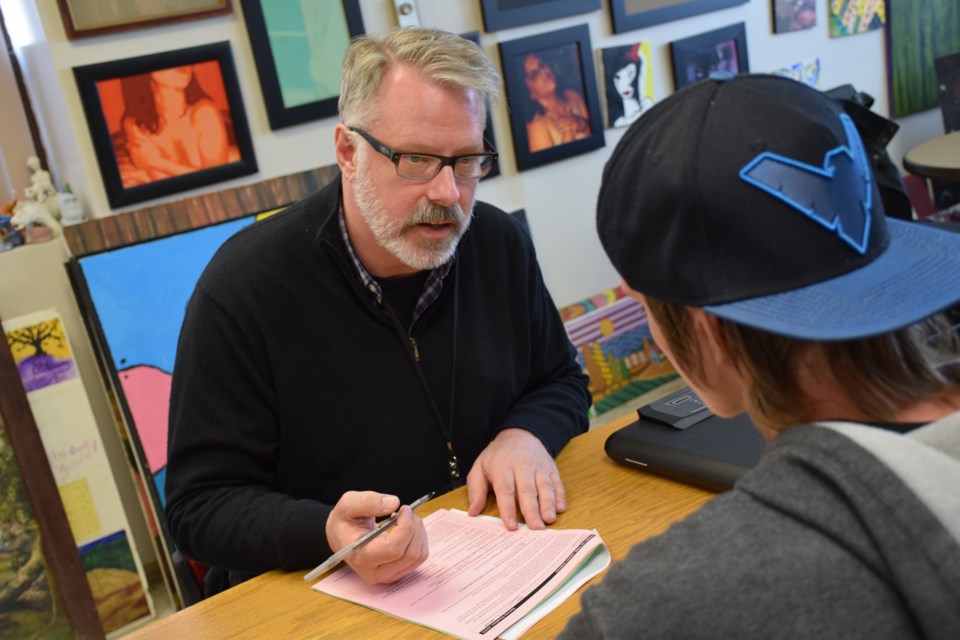No one can be precise about just how many people are homeless in Guelph. Recent estimates suggest that in a given month, 360 citizens experience at least one or more nights of homelessness.
After this week, agencies working to reduce the number of homeless in Guelph should have a better numerical handle on the problem. A broad-based community registry process began Monday and runs for three days as part of the national 20,000 Homes Campaign, an effort of the Canadian Alliance to End Homelessness.
The campaign’s national goal is to house 20,000 of the country’s homeless by July of 2018. Guelph is one of 30 Canadian communities involved in the campaign.
The survey is being carried out as part of the national movement to house the country’s most vulnerable citizens. Locally, the 20,000 Homes Campaign is overseen by the Guelph and Wellington Task Force for Poverty Elimination.
About 125 volunteers are fanning out across the city for three days this week in an effort to identity the 30 most vulnerable citizens, as well as others who experience homelessness.
The plan to have those 30 most vulnerable housed within six months following the survey, an effort that many realize won’t be easy given a number of variables influencing housing issues in Guelph.
Randalin Ellery is the coordinator of local poverty elimination taskforce. On Monday, she said the 125 local volunteers are split into a number of teams covering different locales. Wherever the homeless or those at risk of being homeless go, the teams are visiting.
Lakeside Hope House, Guelph Community Health Centre, Welcome In Drop-in Centre, and 40 Baker Street are among the downtown locations where surveys are being conducted early this week.
Patrons are asked to participate on a voluntary basis. Five dollar gift cards for Tim Hortons coffee are given out to those who take part.
“These are places where people who may already be experiencing homelessness are already going for different programs, meals and services,” Ellery said, adding that there is also a street team in Guelph. The same survey is underway in parts of Wellington County, she said.
Guelph signed on to the 20,000 Homes Campaign this year, but some communities, including Kitchener-Waterloo and Hamilton, completed the registry last year.
Ellery and others said there will be significant challenges in Guelph when it comes to actually finding homes for the most vulnerable identified through the registry process.
“There will be two major challenges for our community,” Ellery said. “One is finding homes, and the other is helping people maintain them.”
Guelph has the lowest vacancy rate of any city in Canada, so finding 30 vacant dwellings will be difficult. The price of rent is high, whereas shelter allowances from Ontario Works or Ontario Disability Support Program are low in comparison.
“There is a pretty big gap between those two numbers,” she added. “We are really advocating to the province for additional rent supplements to help people close that gap, and also looking to show our community’s landlords that people moving into those units have the appropriate supports.”
Tina Brophey is on the Guelph and Wellington Task Force for Poverty Elimination. She was on hand at 40 Baker Street Monday as Day 1 of registry was carried out. She said by early afternoon over 30 people had taken part. The registry, she said, will also be conducted in “the middle of night” in an effort to find those who are spending the night in streets or parks.
“I think for sure it will be successful at raising awareness, and at giving us a good count of who is homeless and why,” she said of the 20,000 Homes Campaign.
She said the effort will need the broader community to rally around it, especially landlords who are willing to work with agencies and government on helping to house the homeless.
Brophey, recognized as a tireless advocate for those living in poverty, has been at risk of homelessness herself. She said there are many ideas floating around about why people are homeless, but those ideas are not necessarily accurate.
“Things like domestic violence and poverty are also contributing factors,” she said.
Other factors, including deep poverty, trauma, mental illness, addiction and medical problems contribute to homelessness.
Brophey agreed that housing the 30 most vulnerable people will be difficult.
“The vacancy rate in this city is horrible,” she said. “And rent is going up.”
